|
|
August 6, 2010
I Saw the Devil release delayed
Kim Ji-woon’s latest noir-thriller I Saw the Devil has seen just that in the form of the Korea Media Rating Board,    having received a “restricted” rating, effectively banning the film, following a wrangle over problematic scenes. having received a “restricted” rating, effectively banning the film, following a wrangle over problematic scenes.
The film’s production company Peppermint and Co. resubmitted the film recently after a month of re-editing in the hopes of receiving an 18+ rating. The Rating Board’s decision to re-apply the “restricted” rating resulted in the cancellation of the film’s press screening last Thursday. The thriller was originally slated for a wide release August 11.
Kim Hyun-woo, the film’s producer, defended the artistic integrity of the movie, saying it portrayed revenge from the eyes of the victim and was deliberately realistic. The Board argued that the scenes in question “severely damaged the dignity of human values.”
A “restricted” rating in Korea means the film is only eligible for limited screenings in special theaters which exclusively program adult films. As no such theaters exist in Korea, the film is effectively banned. Advertising and marketing “restricted” films are also banned.
The commercial thriller, distributed by Showbox, will have no choice but to compromise and make further cuts.The film stars top Korean actor Lee Byung-hun as a secret agent who hunts down and exacts gruesome revenge on the psychopath (played by veteran thesp Choi Min-shik) who killed his fiancé.
Credits: Nigel D’Sa (KOFIC) |
|
|
|
|
|
|
|
|
|
|
|
August 9, 2010
'Devil's extraordinary action was directed by instinct,' Kim Ji Woon

Director Kim Ji Woon is once again presentating stylish action in his own unique way. If one is familiar with Dir. Kim's past work, you will not miss his distinctive and trademark movie-making style of showcasing engaging personalities and characters, sensuous visual fidelity, reinterpretation of the genre, sensible yet stylish elements that co-exist with the stunning action choreography. From the 2005 critically-acclaimed 'A Bittersweet Life' to the 2008 blockbuster 'The Good, The Bad, The Weird' and the soon to be released 'I Saw the Devil' Director Kim Ji Woon directed the visually-spectacular action and maximizing the main character's personality with emotional intensity, clearly drawing the powerful expression all through the thriller feature.
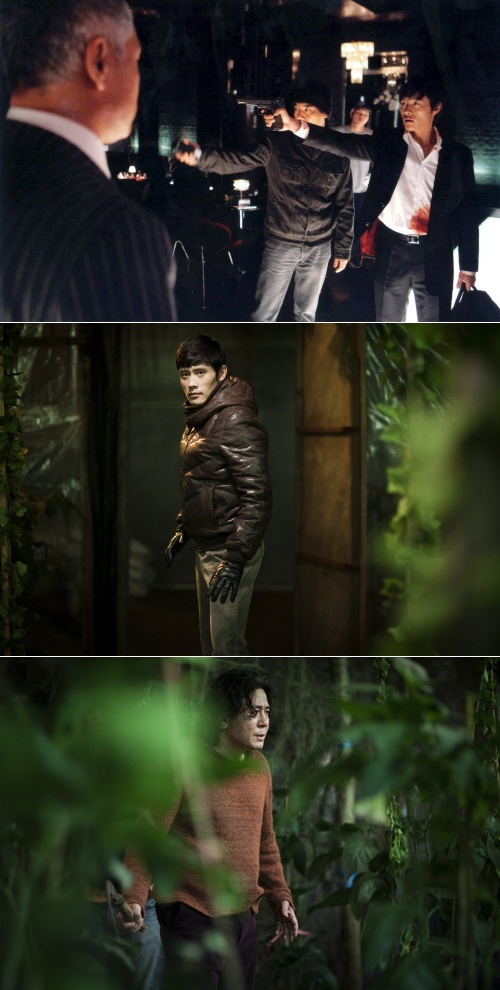
Source: news.nate.com 1 l 2 |
|
|
|
|
|
|
|
|
|
|
|
August 8, 2010
Korean Box Office: August 6-8
The Man From Nowhere, the official international title of Ajeoshi, squeaked by Inception and took the first rank spot which was vacated by Salt, now in the third tier. But the shuffling of the box office was not the big news this weekend. A far more interesting story is the battle over I Saw The Devil.
It has been a while that censorship has so visibly raised its ugly head. It is true that The Butcher, a film that played at the Pucheon International Fantastic Film festival last year, was denied a release in Korea but no one really cared about that. It was an unknown slasher film with unknown actors. However, I Saw The Devil is a big-budget thriller directed by one of the more respected film directors and starring Korea’s two biggest actors–Lee Byeong-heon and Choi Min-shik. The film was given a rating that effectively prevents it from opening in Korea. The production company had already spent a fortune on advertising and reserving theaters and they are refusing to give up the release date coming this week. Will the film open? We will know soon.
Censorship is nothing new to Korean theater, but it is something I thought was almost at an end. It was a common practice at the dawn of the age of Korean cinema, for the Japanese Colonial Government to review and censor films. Usually, this was done for political reasons and eventually, by the late 1930s, the government had completely taken control of the industry as a propaganda tool. However, they also censored for moral reasons. The Bloody Horse (1928) was a film based on the true story of an incest case. Censors took one look at it and chopped off more than 1000 feet of film. It was later denied a release and is now lost. The 60s thru 80s were infamous for the amount of censorship the government imposed on film. The Aimless Bullet (1961) was yanked from theaters after opening for its criticism of society and the government following the millitary coup thought it was too dangerous. From that point, the government put the film industry in a stranglehold that nearly killed it by the 70s. Director Yoo Hyeon-mok faced fines and jail time for his ‘flaunting’ of obsenity laws in Empty Dreams (1965) because it appeared the lead actress bared her back. She didn’t–she was wearing a nude-colored cloth. But it looked like she was nude and that was enough to offend the moral sensibilities of the censors. More recently films like Lies (1999) and Too Young To Die (2002) faced similar struggles–Lies failed, Too Young to Die managed to open–a sign of the changing times under a civilian government. What are we supposed to think now that the government is once again trying to protect our moral sensibilities? Don’t worry, I am sure the conservatives of President Lee’s government will tell us what we can think.
Source: Seen in Jeonju
Thanks to the highlight at ForeverLeeByunghun fan-blog, captures from http://bbs.movie.dau...1504&bbsId=M002





 |
|
|
|
|
|
|
|
|
|
|
|
CONGRATULATIONS!
August 10, 2010
Lee Byung-hun, Son Ye-jin, Bong Joon-ho: 2010 Asian Film Award Winners
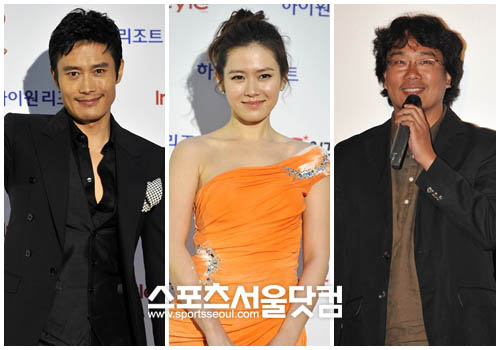
Actors Lee Byung-hun and Son Ye-jin, director Bong Joon-ho have been named as Asia's leading film makers.
The 5th Asia-Pacific Producers Network (APN) Secretariat on August 10th announced, "Lee Byung-hun, Son Ye-jin, director Bong Joon-ho have been selected as impressive winners of the '2010 APN Asian Movies'." Lee Byung-hun and Son Ye-jin, are expected to attend the APN Award Opening Ceremony & Dinner at 7pm taking place at the Sword Lake Hotel Grand Ballroom on August 13.
Asia's largest 'APN' consisted of more than 100 members in 10 countries as South Korea, China, Japan. Taiwan, Singapore, Thailand, Australia and New Zealand, participate as member of Asia's largest producer network. This award represents the Asia-Pacific film producer's award because the award is meant to be special.
Lee Byung-hun and Son Ye-jin who both conveyed great performances on the big screen and television were selected as the winner of this year. Lee Byung Hun was noted for his successful Hollywood debut in 'GI Joe: Rise of Cobra' and the highly-rated KBS2 'IRIS', whom appeared & highly recognized in Asia. Son Ye-jin has been able to transform herself into a variety of performance for each work was her highly value points.
Award-winning director Bong Joon-ho was recognized for the outstanding presentation movie-making skills. Box office features 'The Host' and 'Mother,' with stylish & enriching performances for all to enjoy have elevated the appreciation for South Korean movies.
Source: news.nate.com and lots more, simple gist by EverythingLBH |
|
|
|
|
|
|
|
|
|
|
|
August 10, 2010
Lee Byung-hun, Son Ye-jin, Bong Joon-ho to win APN Awards
By Chung Ah-young

The Asian-Pacific Producers Networks (APN) will honor Korean actor Lee Byung-hun, actress Son Ye-jin and film director Bong Joon-ho at the APN Awards for their contributions to the film industry in the region.
The 5th APN Awards will be held at the Jecheon International Music and Film Festival in North Chungcheong Province from Aug. 12 to 14. APN is a network of some 100 current film producers from 10 Asia-Pacific countries ― Korea, Australia, New Zealand, Japan, China, Hong Kong, Malaysia, Singapore, Taiwan and Thailand.
From this year, the organization will expand the number of winners from one actor or actress of the host country of the APN general meeting to three categories ― actor, actress and director.
Known as a "hallyu" star, Lee recently starred in the popular television drama series "IRIS (2009)" and his debut Hollywood film "G.I.Joe: The Rise of Cobra (2009)."
Son also performed various characters in the film "White Night (2009)" and television dramas "Spotlight (2008)” and "Personal Taste (2010)."
Bong has been internationally recognized for his masterful films "The Host (2006)" and "Mother (2009)."
Cannes-award winning actress Jeon Do-yeon received the award for "Secret Sunshine" in 2007, while Japanese actor Kenichi Matsuyama won the award for his performance in "Death Note" in 2008. Chinese actress Xun Zhou who acted in "The Banquet (2006)," "Painted Skin (2008)" and "Confucius (2010)" was honored in 2009.
Source: chungay@koreatimes.co.kr |
|
|
|
|
|
|
|
|
|
|
|
August 11, 2010
Lee Byung-hun, Son Ye-jin, Bong Joon-ho Win APN Awards
Actors Lee Byung-hun and Son Ye-jin and director Bong Joon-ho have been named the winners of the 2010 APN Awards by the Asian-Pacific Producers Network. They will be awarded the prize in Jecheon, North Chungcheong Province on Friday.
The annual award presented by the organization of over 100 film producers from the Asia-Pacific region used to be given to only one actor or actress from the host country of the APN general assembly that year. It has now been expanded to three categories -- an actor, actress and director.

From left, Lee Byung-hun, Son Ye-jin and Bong Joon-ho
Previous recipients include Jeon Do-yeon of "Secret Sunshine" in 2007 and Kenichi Matsuyama of "Death Note" in 2008.
The upcoming APN meeting, which will discuss potential joint productions and copyright issues, is scheduled for Thursday through Saturday on the sidelines of the Jecheon International Music & Film Festival.
Source: englishnews@chosun.com |
|
|
|
|
|
|
|
|
|
|
|
August 11, 2010
Lee Byung-hun, Son Ye-jin, Bong Joon-ho to win APN award
Reporter : Lucia Hong Editor : Jessica Kim
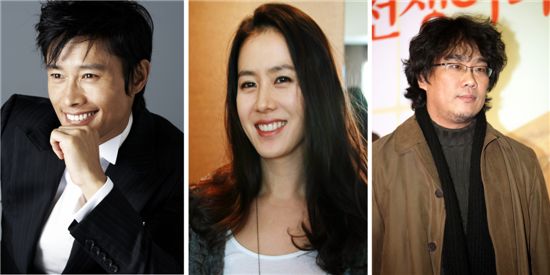
From left to right: Korean actor Lee Byung-hun, actress Son Ye-jin and director Bong Joon-ho
[BH Entertainment, Barunson Entertainment]
Top Korean actors Lee Byung-hun and Son Ye-jin and noted director Bong Joon-ho will be honored at the Asia-Pacific Producers Network (APN), according to the event's host Jecheon International Music and Film Festival (JIMFF) on Wednesday.
The honorees will be recognized for their contributions to the film industry in the region at the 5th annual Jecheon International Music and Film Festival to be held from August 12 to 14 held in the North Chungcheong Province of Korea.
The APN is an association of 100 film producers from 10 Asia-Pacific countries including Korea, Australia, New Zealand, Japan, China, Hong Kong, Malaysia, Singapore, Taiwan and Thailand.
The APN announced that starting this year, they will expand the number of awards categories to actor, actress and director. Before, only one actor or actress from the host country received the award.
Lee is considered one of the most successful actors in Korea, having starred in numerous hit dramas and films. His latest works include blockbuster series "IRIS" (KBS, 2009) and his debut Hollywood film "G.I. Joe: The Rise of Cobra" (2009).
Son, 28, rose to stardom in Asia with her role in the TV series "Summer Scent" (KBS, 2003). She also played the female lead in the movie "White Night" (2009) and most recently in MBC's "Personal Taste" (2010).
Director Bong Joon-ho is known worldwide for his works including blockbuster hit movies "The Host" (2006) and "Mother" (2009) which won various awards at international film festivals in 2010.
Previous winners of this award includes Cannes award-winning actress Jeon Do-yeon for her role in "Secret Sunshine" (2007) and Japanese actor Kenichi Matsuyama for his role as L in the film "Death Note" (2008). In 2009, Chinese actress Xun Zhou, who starred in "The Night Banquet" (2006), "Painted Skin" (2008) and "Confucius" (2010), was handed the honor.
Reporter : Lucia Hong luciahong@ Editor : Jessica Kim jesskim@ <ⓒ10Asia All rights reserved> 10Asia |
|
|
|
|
|
|
|
|
|
|
|
August 9, 2010
No gray zone for Korean films
Picking a Korean film to watch is like flipping a coin. Either you get something sweet and saccharine or you get something vicious and violent.
On the surface, local films can be categorized between the depiction of reality as an idealized, almost fairy tale universe through melodramas such as “The Classic” or the more violent, urban gothic version portrayed in thrillers like “Oldboy,” that revel in the embrace of the macabre.
This summer, it’s been the case of the latter with a slew of unapologetically violent pictures that have garnered much attention from the public -- two of those films are currently sitting atop the domestic box office charts.
“(Korean) movie studios are trying desperately to figure out what sells and what audiences want,” said Lee Yong-kwan, director of the Pusan International Film Festival and professor of Chung-Ang University’s department of film studies. “They want to give the public something different, something they haven’t been exposed to and I think that is why this year we’ve seen so many violent pictures produced by big studios starring big movie stars -- it’s because we’ve seen it all before.”
As of this writing, “The Man from Nowhere,” Won Bin’s ultra-violent turn as a knife-wielding madman on a mission to clean out the criminal underworld, has topped the domestic box office with over a million ticket sales already notched during its opening week. The film unseated yet another violent local picture, director Kang Woo-seok’s “Moss,” as the top Korean film.
This is impressive box office performance given that the Korea Media Ratings Board slapped both with a hard 19+ rating. “Kang Woo-seok directing a picture so completely unlike his previous films reveal how desperate the local film industry is in trying to find the next big thing to get in on,” said a film producer who asked to remain anonymous.
“So far it seems to be working. Everyone seems to be talking about them.”
Writer-director Kim Ji-woon’s controversial latest, the Lee Byung-hun, Choi Min-sik tandem, “I Saw the Devil” -- set for an Aug. 12 release -- has been scoring high in the buzz meter among local audiences not to mention attracting plenty of media attention since it was recently given a limited release judgment due to its excessive screen violence.
“I Saw the Devil” is currently being trimmed for a third submission to the KMRB.
So have filmgoers just been in a mood for some violence or has there always been a polarized preference in films from the masses?
Has the recent string of heinous crimes of child rapists stirred the public enough for them to want to see on-screen revenge tales where gruesome demises are handed to murderers and rapists?
“Personally, I don’t think this recent rush toward releasing or producing violent pictures is some sort of reflection of the current social climate,” Lee said. “It’s not as complex as that. I think it has a lot to do with movie studios wanting to latch onto something new and something different.”
Lee went on to say due to the polarization of genres in the local film industry, the ones that will suffer will be filmmakers who want to tell stories about everyday folks. “This type of bandwagon mentality will eventually cut out the guys in the middle -- the ones making slice-of-life dramas and films that really reflect Korean society,” Lee said. “They might be able to carve out a niche by selling them online but I don’t see much of a place for them at multiplexes.”
If one were to look for a common thread that ties all of this together, it is of course, escapism. “To be fair, it isn’t just Koreans that go to the movies for escapist entertainment,” Lee said. “Moviegoers from all over the world want to be entertained and want to forget about life while watching a film. But the biggest difference between our industry and theirs is that there is enough of a demand for alternative and dramatic films for those genres to survive.”
By Song Woong-ki ([email protected]) koreaherald.com |
|
|
|
|
|
|
|
|
|
|
|
The Dev l You Know l You Know
The Korean press is reporting I SAW THE DEVIL just passed the KMRB. It will appear in theaters in a couple of days with an 18 rating. It took three tries to get passed by the KMRB, but no one I knew related to the movie seemed worried at all. From what people tell me, this was Kim Jee-woon’s “last hurrah” before going to Hollywood, so he just wanted to have a good time and make a crazy film that he would like. Hopefully I will see it Thursday, and will report what I think asap.
Previous related entry Will We See the Devil
Credits & thanks to Mark Russell
 capture copied from nate.com
capture copied from nate.com
|
|
|
|
|
|
|
|
|
|
|
|

August 12, 2010
(Movie Review) 'I Saw the Devil,' a brutal, stylish thriller
By Kim Hyun
SEOUL, Aug. 12 (Yonhap) -- Kim Jee-woon's new thriller, "I Saw the Devil," which hit theaters on Thursday, almost didn't make it to the big screen. Due to its hardcore violence, the film initially received a restricted screening rating. Filmmakers had to trim some of the more excruciating fat before the 18-rated thriller could be shown in theaters.
Kim called watching the finished product, which is a grueling exploration into the showdown between a serial killer and an equally brutal avenger, "eating sushi short of wasabi" at a press premier Wednesday. Despite Kim's comments, the drama is overladen with a series of decapitations and gripping violence. Yet, many of them are no more cannibalistic than what we have seen in thrillers like Park Chan-wook's "Sympathy for Lady Vengeance" or Ridley Scott's "Hannibal."
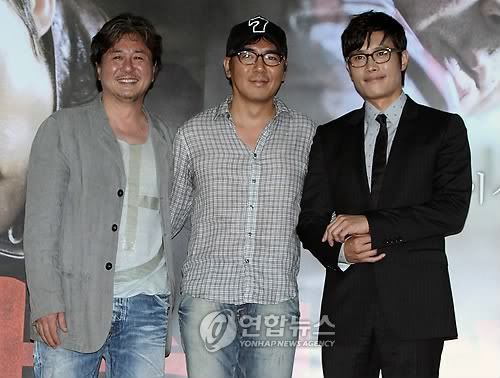
However, what really counts here is the matter of effectiveness. Does the drama pack enough empathy for the audience to sit through the violence?
The movie opens on a beautiful snowy night as romantic guitar melodies flow to the methodical movements of a car's windshield wipers. Ju-yeon (Oh San-ha), the daughter of a retired police officer and fiancee of a top secret agent, gets a flat outside town and has to wait for assistance. It's here that the serial killer, Gyeong-cheol (Choi Min-sik), makes his entrance, appearing from out of nowhere.
Gyeong-cheol is a stony-eyed psychopath who kills for amusement. A plump, middle-aged, school bus driver in a Seoul suburb, he lets no chance go to waste. Ju-yeon becomes his latest prey and is found decapitated in a horrible state.
Su-hyeon (Lee Byung-hun), the victim's fiance and a secret guard with the National Intelligence Service, decides to track down the perpetrator. He's bent on making Gyeong-cheol suffer as horribly his fiance did. After planting a GPS chip on the villain, Su-hyeon is able to effectively track the serial killer, but when he lashes out, his attacks fail to deal the finishing blow.
Vexed with entrapment, Gyeong-cheol seeks help from his fellow serial killer and discovers the GPS capsule. This is when the real showdown begins.
To endure the tormenting scenes of violence, the audience needs to form an emotional bond with Su-hyeon. They need to identify with his quest for vengeance, and the reasons why he keeps catching and setting the serial killer free. Su-hyeon apparently does this to make him suffer, but the motive works against the moral element of the drama. The empathy aspect suffers as a result.
Befitting his reputation from "The Good, the Bad, the Weird" and "A Bittersweet Life," Kim has beautifully shot his latest noir. Each scene is masterfully drawn from real-world Seoul and its idyllic suburbs.
But the central part of the film lies with the frenetic confrontation between the two actors. Choi has a marvelously impassive face when he says, "I don't know pain, nor fear. There's nothing you can get from me. You've already lost." His emotionless face never wavers.

It is Lee who has to express the subtle changes of a man whose quest drains him over time. To endure the 144-minute revenge drama, the audience needs to identify with Lee's gripping anger and his excruciating method of vengeance.
Choi, who played a flesh-eating perpetrator in "Sympathy for Lady Vengeance" (2005), said he focused on "technically" playing his role. "I only had a few scenes as the criminal in 'Lady Vengeance' and I was thirsty. With 'I Saw the Devil,' it's excessive," he said in the press screening. "This is perhaps the film where I was the least immersed among the films I've done, and I approached it rather technically."
Lee, who made his Hollywood debut with "G.I. Joe: The Rise of Cobra" last year, recalled his role as "extremely exhaustive." It was "challenging to play a man who has to avenge with no facial expressions, but at the same time who has to subtly show various emotions of anger, sadness and anxiety."
"I Saw the Devil," produced by Peppermint and Co. and distributed by Showbox, was released on Thursday.
Source: [email protected] yonhapnews.co.kr |
|
|
|
|
|
|
|
|
|
|
|
|
Captures from nate.com, credits as stated on the images
|
|
|
|
|
|
|
|
|
|
|
|
August 12, 2010
Testosterone-fueled films dominate
By Lee Hyo-won
Korean actresses should be enjoying a nice long vacation on exotic beaches this summer — as male stars unabashedly show off their macho side onscreen there seems to be little room for the ladies.
The alpha male, as depicted through recent Korean cinema, has been reverting to a more primitive, sticks and stones standard — the survival of the fittest is measured by a man’s ability to not only outwit an opponent in messy mind games but more importantly unleash killer instincts to endure no-cut skirmishes.
“Major studios are producing super violent films starring superstars. They’re trying to feed the audience’s appetite for something different, and it seems to be working. Director Kang Woo-seok, for example, has produced something really different from his previous works, and it is catching people’s attention,” said a researcher at the Korean Film Council.
Kang’s “Moss” features a heavy bevy of men including Jung Jae-young disguised as a grandpa engaged in acts of all sorts of physical and spiritual violence. It has attracted over 3 million viewers while “Inception,” reigned by tough guys Leonardo Dicaprio and Ken Watanabe, continue to draw packed screenings. Won Bin has contributed to the scene as a knife-wielding madman in “The Man From Nowhere,” which has brought in an audience of more than 1.5 million in just nine days as of Thursday. With the high online reservation rate the hardboiled action flick is expected to continue topping the box office.
Actresses thus should prepare more tanning lotion, since the testosterone tsunami is expected to make waves for the meantime.
“I Saw the Devil” was finally released in theaters Thursday after controversial rounds with the Korea Media Ratings Board for its explicit content. Hallyu star Lee Byung-hun (“G.I. Joe”) plays a National Intelligence Service agent who becomes lustful for vengeance after he loses his beloved fiancee to an evil serial killer, played by “Oldboy” star Choi Min-sik.
As of late, the spotlight in Korean cinema has shifted from beautiful male-female duos playing lovebirds to odd pairings of clashing male co-stars. The curious chemistry between a heartthrob and an elder veteran actor — much like hit spy flick “Blood Brothers,” starring Kang Dong-won and Song Kang-ho — is enough to make headlines. In the film Lee pushes forward the drama of the narrative while Choi propels the action with his relentless and unpredictable axing and other outbursts of violence.
Coming to theaters on Aug. 26 is another film featuring skirmishes between two actors, though with a more comical twist. “Jukigo Sipeun (Want to Kill)” is about two foes who end up being hospitalized in the same ward and try to destroy each other with the use of back scratchers, water vaporizers and other seemingly harmless items.
The black comedy shows how profound hatred can “inspire” two paralyzed patients; one of them, a compulsive suicide attempter, even prolongs his death wish and trains to regain his energy in order to take on his enemy. The duo are played by middle-aged household names Cheon Ho-jin and Yu Hae-jin, who both appear as supporting characters in “I Saw the Devil” and “Moss,” respectively. Yu shines with his signature slapstick while Cheon, who has assumed more serious roles, uses his charismatic glances to comical ends.
Fans of six packs and rough action sequences can moreover look forward to watching not one but all of their favorite action heroes in one sitting. “The Expendables” brings together the big boys including Sylvester Stallone, who also directed the film, Bruce Willis, Mickey Rourke, Jet Li and the return of Dolph Lundgren, as well as more recent stars such as Jason Statham, Terry Crews, Steve Austin and Randy Couture. They play mercenaries on a mission to overthrow a South American dictator. It will open in theaters on Aug. 18.
Sul Kyoung-gu, whose cinematography is crowned by his role as the hardball detective Kang Cheol-jung, returns to the screen as a former cop, who, framed for murder, is forced to go on the run. Though Sul is known for having braved grueling conditions on a desert island in “Silmido” and fighting a tsunami in “Haeundae,” he says his latest role in “Haegyeolsa (Personal Investigator)” has been the toughest.
“I really wanted to quit,” he told reporters during a promotional event for the film in Seoul, Wednesday. He suffered injuries and braved wire action sequences for the first time. “They said they were going to use a stuntman for a scene where my character falls from a five-story building, and I said I’d do it. But once I actually tried, I couldn’t move my legs,” he said. The film is slated for release around Chuseok next month.
Source: hyowlee@koreatimes.co.kr |
|
|
|
|
|
|
|
|
|
|
|
August 12, 2010
Lee Byung-hun may shoot "G.I. Joe" sequel early next year
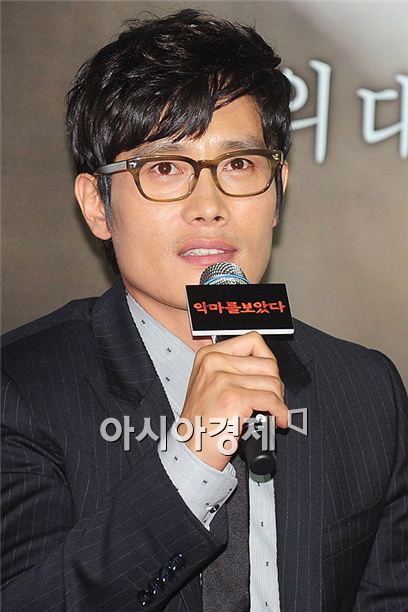
Top Korean actor Lee Byung-hun says filming for the sequel to Hollywood action flick "G.I. Joe: The Rise of the Cobra" is expected to start early next year.
Lee made the remark on Wednesday during a press screening and press conference for his movie "I Saw the Devil," critically acclaimed director Kim Ji-woon's latest pic co-starring actor Choi Min-shik from smash hit Korean pic "Old Boy." "We were supposed to go into shoot around winter of this year but I had heard it would be delayed to summer of next year over problems with the scenario. But then I heard that the scenario is done so I think we'll start early next year but I'm not sure about this either," Lee explained.
The 40-year-old actor, long considered one of the most popular actors in Korea, made his Hollywood debut through the hit action figure pic from last year, playing the role of Storm Shadow opposite actors Channing Tatum and Sienna Miller.
"I Saw the Devil," about a secret agent (played by Lee) plotting revenge against a serial killer (Choi) who killed his fiancee, has been lauded one of the most anticipated films this year for the collaboration of filmmaker Kim of "The Good, The Bad, the Weird" and two of the country's top actors.
The revenge thriller opened in theaters today after three rounds of ratings reviews -- the film was slapped a restricted rating twice before it received approval for an 18+ rating. In Korea, a restricted rating virtually bans a film from being screened since they can only be shown in special theaters only showing adult films but no such theaters exist in the country.
Reporter: Ko Kyoung-seok kave@ Editor: Jessica Kim jesskim@ <ⓒ10Asia All rights reserved> 10Asia
|
|
|
|
|
|
|
|
|
|
|
|
August 12, 2010
Is relentless violence onscreen justified?
By Lee Hyo-won


Choi Min-sik, left, and Lee Byung-hun
in the poster for the thriller "I Saw the Devil"
"I Saw the Devil" was finally released in theaters Thursday after several painful raps by the Korea Media Ratings Board (KMRB) for, among other things, serial killers with a knack for mutilating bodies and a taste for human flesh.
Director Kim Jee-woon argues that reality is often stranger than fiction, and that the nauseating cruelty depicted in his latest thriller can never quite catch up with real life, especially with the KMRB chopping off a good seven minutes of the film. "It’s like sushi with a little less wasabi. The savory texture of the fish is still there but with a little less tang," Kim told reporters about the censored version of "Devil," Wednesday in Seoul.
While subtle hints of "Hannibal-esque" cannibalism remain, explicit depictions of handling human body parts like pork chops are gone. And yet, even the lead actor Lee Byung-hun said the film is "still smothered with plenty of wasabi," and indeed, the film offers some of the most grotesque images that will be difficult to erase.
Lee stars as an intelligence agent whose fiancee is killed by a psychopathic serial killer (Choi Min-sik). Blinded by sorrow and burning vengeance, he sets out to not only kill but slowly torture the culprit.
Can relentless violence on film be justified? The director and cast of "Devil" say yes.
"If someone watches my movie and actually tries copying the violent acts, I believe that person would have acted aggressively with or without my film. I think it’s important to take preventive measures to restrain such aggressors before anything happens in the first place," said Kim.
Choi, the antihero of "Oldboy" who has already played a ruthless killer in "Lady Vengeance," agrees. "Ethics in different forms of cultural content, from films to novels, always become an issue. But I agree with the director. We are addicted to all sorts of violence, from verbal to political, and we sometimes become immune to it all," he said.
The actor said that films allow people to look at violence from a critical view, thereby giving way to a mature arena for discussion and debate. "I once saw 'The Antichrist' in Italy and it was really bloody. I never close my eyes during a movie but I had to two or three times for this one. Some people were clapping while others swore vehemently, and it was wonderful to see them debating afterward."
Maryanne Redpath, director of the Berlin Film Festival's Generation section, previously told The Korea Times that she includes films with more mature, explicit content or themes in the teenager's section. This is for the purpose of challenging adolescents to think critically and converse.
Choi’s co-star furthermore stressed that the drama, rather than the gore, propels the narrative. “The Good, the Bad, the Weird” director seems to have brainstormed ways to shock the audience with realistic depictions of inhumane savagery, along the lines of axing vulnerable young women, but the film also focuses on the spiritual transformation — or degeneration — of the protagonist as he mercilessly hunts down the murderer. But Lee’s character starts drowning in his newfound instinct for violence he gazes too long into the abyss — just as Nietzsche once said, “He who fights with monsters might take care lest he thereby become a monster.”
"It’s a problem when someone justifies violence or starts thinking it’s OK because everyone else does it. This can be witnessed in our everyday lives, like the jaded Internet community," said Lee.
The film does leave room for discussing the nature and depiction of violence once — or if — the viewer recovers from the shock factor.
Source: hyowlee@koreatimes.co.kr |
|
|
|
|
|
|
|
|
|
| |
|